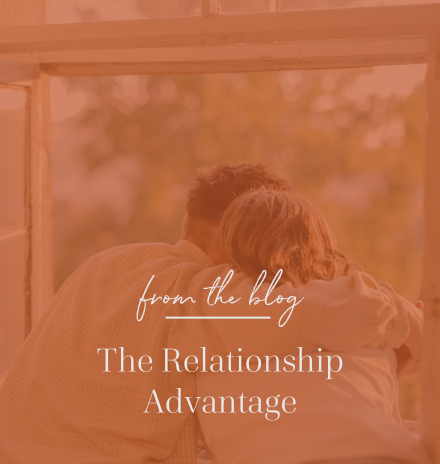The Relationship Advantage

Several years ago I was sitting around a room with a group of women who I used to meet with regularly. A few were talking about their relationships with their spouses when one woman looked at me and said, “You have a great relationship. How do you do it?”
The question took me aback. Like many couples, my husband and I disagree and can get annoyed with each other and even get into arguments. I’d never thought about my relationship being particularly better than others, but by the additional comments of the other women there, it was clear they did.
I began by saying, “Don’t make the mistake of thinking we are perfect and that ‘stuff’ doesn’t happen. Just this week, my husband had the family’s long-haired cat, Beau, shaved with Lion’s cut while I was gone. I am still upset about it.” They roared with laughter. Likely the combination of my husband’s ‘interesting’ choice and an appreciation for my transparency.
But this week when I was walking with a friend and she too asked how I make it work in my relationship, it got me thinking about relationships and the fundamentals of a healthy one.
From my hundreds and hundreds of conversations with clients and over 20+ years of marriage, here are a few hacks that will give your relationship an advantage.
- Do your work. Not your job. Not your career profile. But truly get to know yourself so that you can know what you really want and be available to receive it. I did a lot of work before getting into my relationship which means I didn’t bring as many of my defenses, blindspots, and insecurities into it. That doesn’t mean there aren’t things I’m still learning from my relationship. But I learned long ago that relationships are our teachers. They will bring to the surface what we still need to learn. To experience the kind of relationship that’s possible for you, you’ve got to be willing to do the real work. Ask yourself… What am I truly worried or afraid of that is triggering me in my relationship right now?
- Own your part. This means owning the piece that is yours. We’re 100% responsible for 50% of the relationship. It can be easy to blame others for a problem. It reflects a high level of intelligence to be able to see things without judgment. Be curious and humble. Maybe you’ve trained the person to treat you a certain way or you haven’t communicated clearly what you want. It’s not about blame but instead exposing where you’re playing a role. Once you own your part, your ego quiets itself, you become less defensive, get what you are meant to learn, and can effectively resolve any conflict. Ask yourself…How am I unwittingly contributing to what I am blaming another for? What part am I responsible for?
- Find the good. It’s there. The other day a friend mentioned how impressed she was with her husband’s handling of their son’s crashing the family car into the garage. Normally impatient, he was calm and didn’t get upset. I asked if she’d mentioned to her husband how well he’d handled the situation. She hadn’t. It’s important to affirm what we want to see more of in our relationships. To be generous with our compliments. As humans, we are inherently drawn to see the negative. It’s our built-in self-protection mechanism. The problem is we get more of where our attention is. What I am saying is to catch the good in action and say it out loud. Not only will it move your attention and improve your relationship, but you’ll also get more of what you want. What is going right that I can affirm?
- Be clear. Ask for what you want. Too often we’re hoping and expecting others will understand us. Long gone are the days I’d use hope as my strategy in my relationship. Working on something and hoping my husband would see it or be grateful is not clear enough. Today, I’ll say “I’d really like…” or “I’m about to tell you something, and I am simply looking for you to listen— no solutions necessary.” Or “When I speak right now, I need you to be patient before you respond.” What happens is I get exactly what I want, and he isn’t frustrated that he’s let me down. The same holds true at work. Be clear. “What I want is…”
- Be vulnerable. Early in my marriage, my husband scheduled a “financial summit” between the two of us. After a few minutes, I started crying. I told him I couldn’t continue and needed to step away and return later. I needed to see what was coming up. He granted me the space. Once I’d identified a deep belief that I was not smart with money and where it came from, I shared this with him. It turned everything around. I didn’t erroneously project my emotion on him and he could practice patience and compassion for me around this topic. “This is something I’ve learned or observed about myself. I’m working on it and ask that you have patience and compassion for me as I do.”
- Communicate. Communicate. Communicate. Don’t stop until you get to the root of the wart. In the situation where the cat was given Lion’s cut, I could focus and yell about what he did — and I did — but eventually, I asked a better question: “What do you really want?” His answer gave us something we could both work with. My response was, “Ok, you don’t have to shave the cat next time to get that.” Ask another…“What is it you really want?”
Beyoncé once said, “If everything was perfect, you would never learn and you would never grow.” This is especially true in relationships.
Remember sometimes our greatest points of conflict in relationships are opportunities to investigate our own beliefs and patterns of behavior.
Cheers to your opportunities for growth. On the other side is peace, love, and freedom — and who doesn’t want more of that?
Affectionately,
~Rita








Leave a Reply
Want to join the discussion?Feel free to contribute!